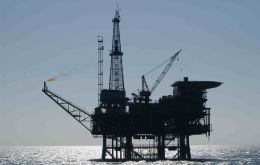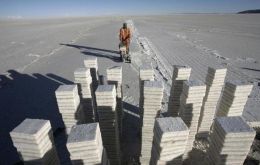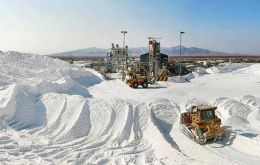MercoPress. South Atlantic News Agency
Energy & Oil
-
Wednesday, July 14th 2021 - 09:00 UTC
Lack of semiconductors and electronic components limiting Brazil's car production

Brazil's Association of Automotive Vehicle Manufacturers, ANFAVEA announced that export expectations for 2021 should reach 389,000, a significant increase over the previous estimate of 353,000. Furthermore, overseas sales will stand at 20% over the 2020 figure.
-
Wednesday, July 14th 2021 - 08:30 UTC
Volkswagen picks Uruguay to make e-cars Latin American landing

The traditional German automaker Volkswagen has chosen Uruguay as the first country in Latin America to receive its assortment of fully electricity-powered models, it was announced during a ceremony which was attended by President Luis Lacalle Pou.
-
Thursday, July 8th 2021 - 09:56 UTC
Argentina takes action against foreign oil companies operating on South Atlantic continental shelf

Argentina's Ministries of Foreign Affairs and Energy Wednesday announced sanctions were to be imposed on three companies for operating illegally in the South Atlantic.
-
Thursday, July 8th 2021 - 09:48 UTC
Three companies (two UK and one Israel) involved in Falklands' oil industry, added to Argentina's sanctions list

Argentina announced it has launched a sanctions process against several foreign oil companies, the UK based Chrysaor Holdings Ltd, Harbor Energy Plc, and Israel's Navitas Petroleum for involvement in hydrocarbons activities, with illegitimate Falkland Islands licenses, in the Argentine continental shelf, more precisely at the Sea Lion project in North Malvinas basin
-
Tuesday, July 6th 2021 - 09:15 UTC
Mining company pledges to invest US $ 34 million in lithium plant in northern Argentina

A local subsidiary of China's Ganfeng Lithium has purchased a 23-hectare property in the General Güemes Industrial Park in the northwestern Argentine province of Salta, it was announced.
-
Wednesday, June 30th 2021 - 00:18 UTC
Volkswagen goes electric and ends making internal combustion engines in 2035

Germany's Volkswagen will no longer make cars with internal combustion engines in Europe by 2035, a board member said. The announcement comes as carmakers in Europe face mounting pressure to combat climate change and curb emissions under new EU regulations
-
Tuesday, June 29th 2021 - 08:45 UTC
Energy minister calls for “conscious” use of electricity throughout Brazil

Brazil's Mines and Energy Minister Bento Albuquerque Monday launched an appeal for “conscious” use of water and energy in a televised message during which he admitted the seriousness of the current drought and its impact on the production and distribution of electricity.
-
Friday, June 18th 2021 - 09:23 UTC
Major European firms sign agreement for sustainable exploitation of Chilean lithium

As the world transitions from fossil fuels to sustainable energy-powered vehicles, four European giants have signed an agreement for the sustainable exploitation of Chilean lithium, it was announced Thursday in Santiago.
-
Tuesday, June 15th 2021 - 09:40 UTC
Russia invites Argentine officials to visit nuclear power plant similar to the one planned for South Atlantic

Russia's intentions to install nuclear power plants in Argentina took a new step Monday as the Rosatom agency invited Argentine officials over to visit its floating plant in Siberia.
-
Tuesday, June 8th 2021 - 09:00 UTC
Price of fuel goes up 12% in Uruguay

The Government of Uruguay Monday announced a 12% increase in the price of fuels due to the increase in the international value of oil, a product that Uruguay imports 100%.
